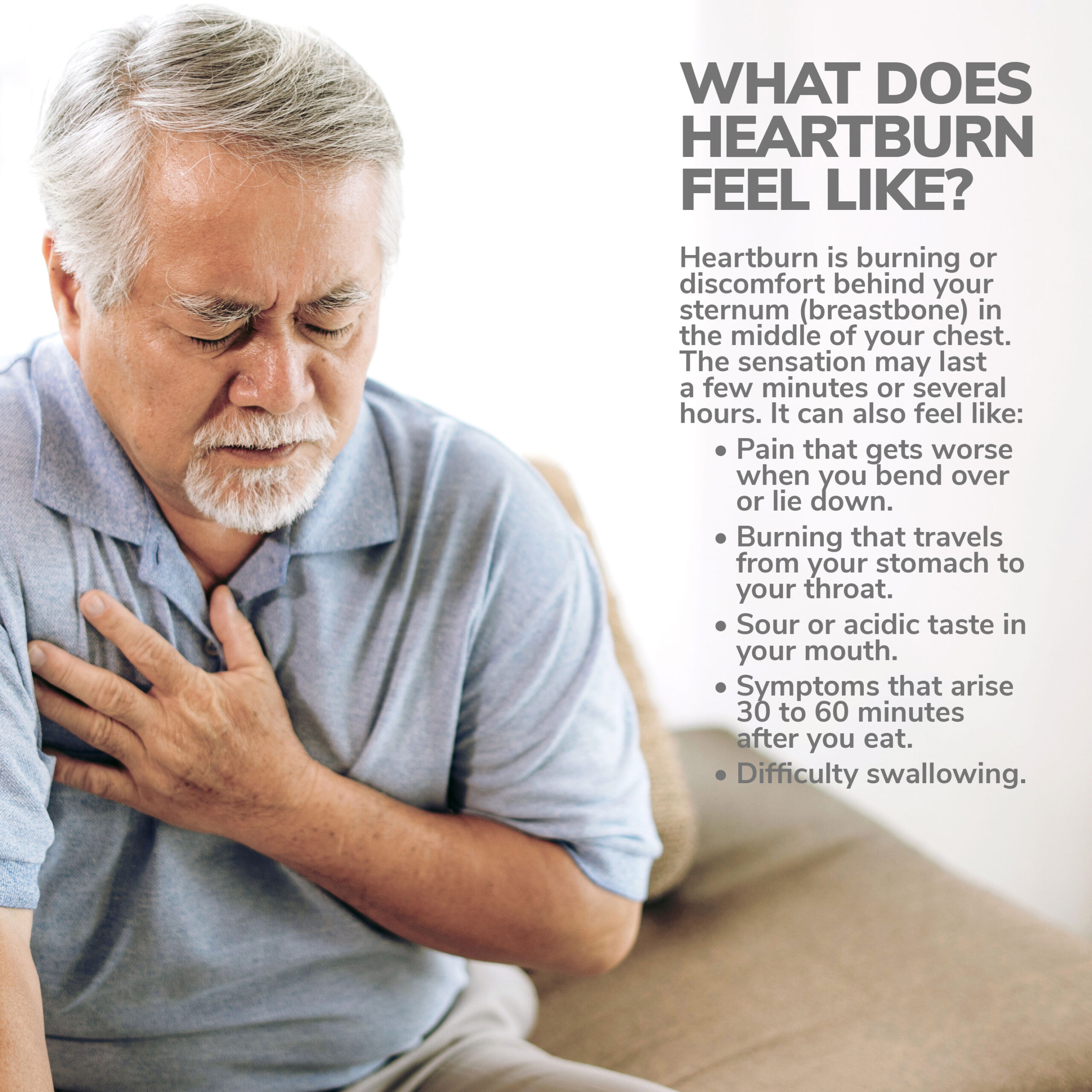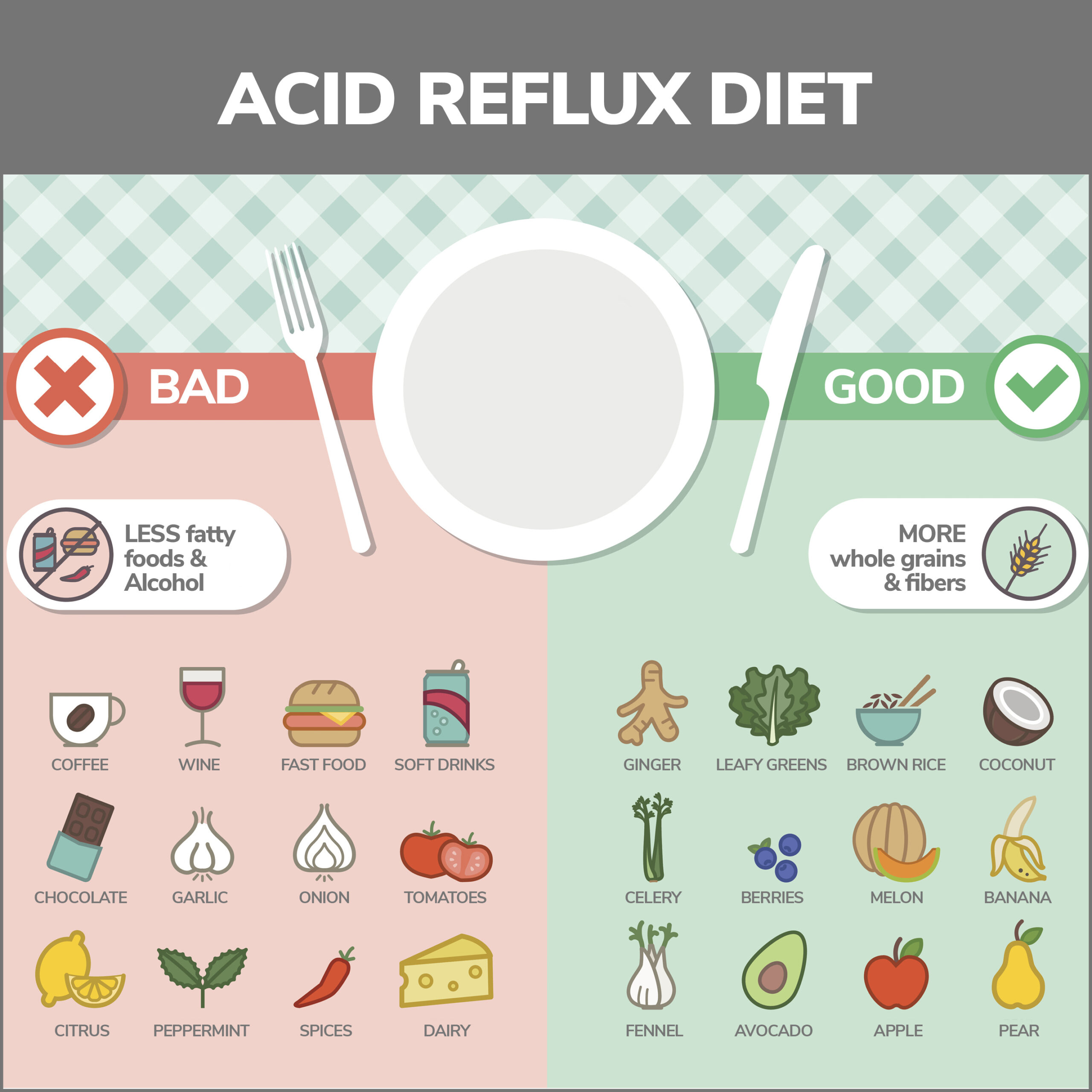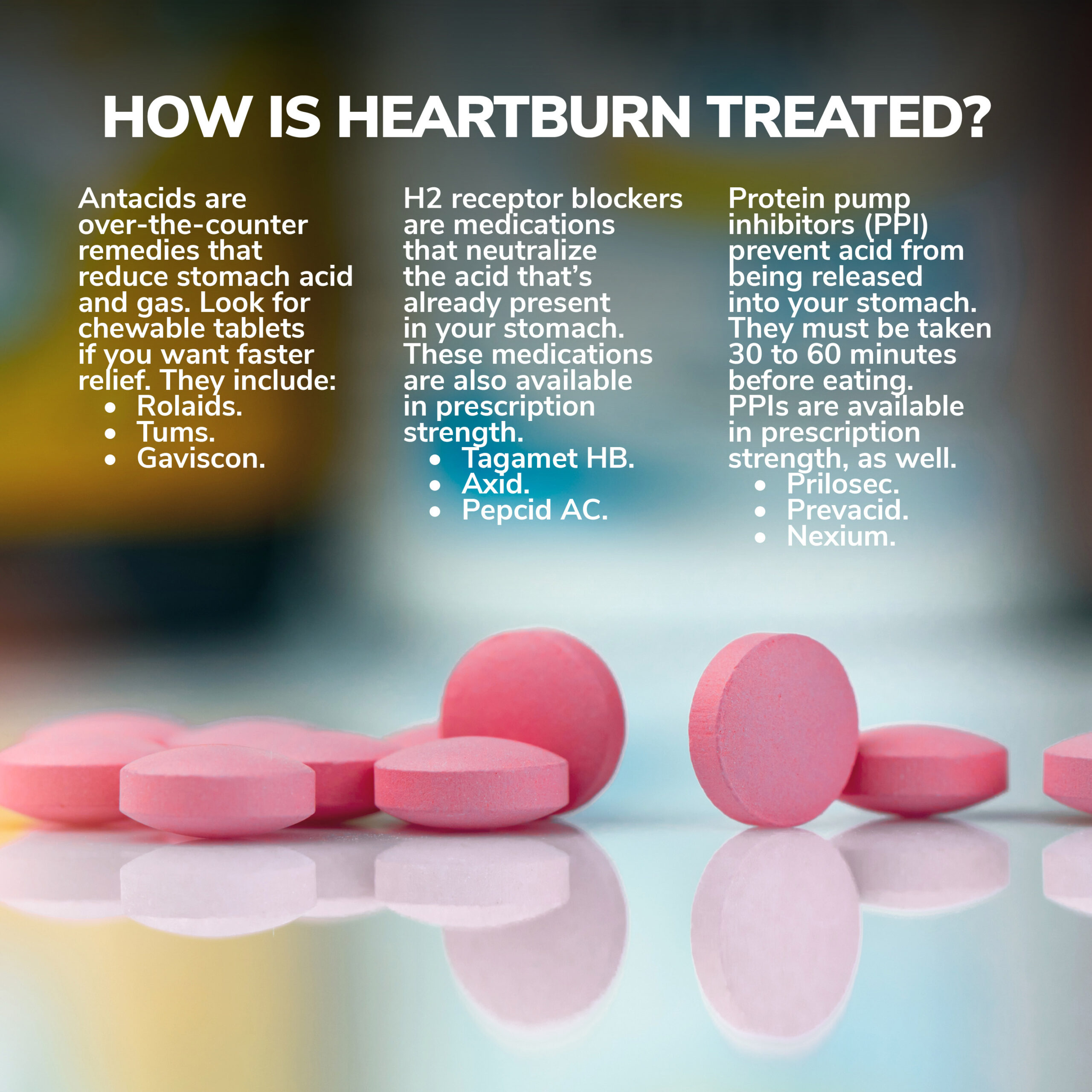
Heartburn
Contrary to its name, heartburn isn’t related to your heart. But that doesn’t discount the very real aggravation it can cause. That burning sensation it causes behind your breastbone can be accompanied by a bitter or sour taste in your mouth or throat. Although it could be a symptom of other disorders, heartburn typically occurs when you lie down or have eaten a large meal.
What Causes Heartburn?
To understand heartburn, it’s helpful to know how your digestive tract works. First, the food you eat travels through the esophagus, a tube between your mouth and stomach. This tube is also called the food pipe. A valve called the lower esophageal sphincter (LES) is located where the esophagus and stomach meet. The LES opens to allow food to pass into your stomach and then closes to prevent the food from splashing back up your esophagus.
Your stomach contains very powerful digestive acids that break down food. It’s built to withstand these acids. Your esophagus can’t be exposed to these acids without injury. When the LES doesn’t close tightly or opens too often, some of the contents of your stomach backwash into your esophagus, irritating it. This is called acid reflux.
What Does Heartburn Feel Like?
Heartburn is burning or discomfort behind your sternum (breastbone) in the middle of your chest. The sensation may last a few minutes or several hours. It can also feel like:
- Pain that gets worse when you bend over or lie down.
- Burning that travels from your stomach to your throat.
- Sour or acidic taste in your mouth.
- Symptoms that arise 30 to 60 minutes after you eat.
- Difficulty swallowing.

What Can Trigger Heartburn?
Many foods and drinks can trigger heartburn or make it worse. These include:
- Citrus fruits.
- Citrus juices.
- Tomatoes.
- Onions and garlic.
- Fatty foods.
- Greasy foods.
- Carbonated drinks.
- Caffeinated drinks.
- Alcohol.
Your lifestyle can also trigger or aggravate heartburn. Minimize heartburn or the chance of getting it by changing these habits:
- Eating three large meals – Instead of three large meals, which can tax your LES, eat six small ones.
- Eating quickly – Heartburn can be prevented if you slow down at meals. Chew each bite slowly.
- Going to bed on a full stomach – You should wait at least two hours between eating and lying down. This way, food has time to travel from your stomach to your small intestine instead of backing up into the esophagus.
- Exercising on a full stomach – Exercising on a full stomach can increase pressure on your abdomen, which invites heartburn. A rule of thumb is to wait two hours before hitting the gym.
- Smoking – Nicotine can weaken the LES. Second-hand smoke can also impair it. Quitting smoking is good for your overall health and the well-being of the lower esophageal sphincter.
- Wearing tight clothes, belts, and shapewear – These items can compress the stomach, pushing acid into the esophagus.
- Being overweight – When you’re heavy, the excess weight presses on your abdomen, causing backflow or LES leakage.
- Being stressed – Stress can cause the overproduction of stomach acid and trigger heartburn.

Is There a Difference Between Heartburn and Indigestion?
Heartburn and indigestion are often used interchangeably, but they’re actually not the same. When you have heartburn, stomach acid flows back into the esophagus. If you have indigestion, also called dyspepsia, you have trouble digesting food. This produces bloating, abdominal pain, and abdominal distension (stretching).
How Is Heartburn Treated?
Several medications can ease heartburn. These include Antacids, H2 Receptor Blockers (histamine blockers), and Proton Pump Inhibitors.
Antacids are over-the-counter remedies that reduce stomach acid and gas. Look for chewable tablets if you want faster relief. They include:
- Rolaids.
- Tums.
- Gaviscon.
H2 receptor blockers are medications that neutralize the acid that’s already present in your stomach. These medications are also available in prescription strength. They include over-the-counter remedies such as:
- Tagamet HB.
- Axid.
- Pepcid AC.
Protein pump inhibitors (PPI) prevent acid from being released into your stomach. They must be taken 30 to 60 minutes before eating. PPIs are available in prescription strength, as well. These medications include:
- Prilosec.
- Prevacid.
- Nexium.

You should also avoid medications, as they can trigger or worsen heartburn. These include:
- Aspirin, if used regularly.
- Nonsteroidal anti-inflammatory drugs (NSAIDs) such as ibuprofen, naproxen, and Celebrex.
Other medications are known to relax the LES muscle, permitting stomach acid to flow back into the esophagus. These include:
- Sedatives.
- The hormone progesterone.
- Theophylline (an asthma medication).
- Tricyclic antidepressants.
- Narcotic painkillers.
- Iron and potassium supplements.
- Osteoporosis medications.
How Do I Know If It’s a Heart Attack or Heartburn?
A heart attack occurs when one or more of its arteries are blocked. Heartburn is the result of stomach acid backing up into your esophagus. Confusion between the two can happen because of the same location of pain in your chest. It may make you afraid that you’re having a heart attack. There are several classic symptoms of a heart attack that differentiate it from heartburn:
- Chest pain that feels like pressure, squeezing, tightness, or a heavy, crushing weight.
- Pain spreading to the arms, neck, or jaw.
- Breaking into a cold sweat.
- Lightheadedness.
- Shortness of breath.
If you’re unsure of whether you’re having heartburn or a heart attack, don’t try to guess. Be sure to get medical attention right away.
What Are the Complications of Heartburn?
When you have heartburn occasionally, it’s not serious. If you have it more than twice a week for several weeks, it may be a symptom of GERD (gastroesophageal reflux disease). When you have GERD, your esophagus is regularly burned with stomach acid, and its tissue becomes damaged.
Short-term heartburn isn’t cause for alarm. Long-term GERD can cause serious health issues. These include:
- Barrett’s Esophagus – This condition affects people with long-term GERD. Acid reflux damage to the esophagus can change normal cells in its lining to abnormal cells resembling those in your intestine’s lining. Although rare, Barrett’s esophagus can raise your risk for esophageal cancer.
- Esophageal Cancer – If Barrett’s esophagus leads to cancer, it will be one of two types: adenocarcinoma, which develops in the lower part of the esophagus, or squamous cell carcinoma, which affects the middle and upper sections of the esophagus.
- Esophagitis – Esophagitis is inflammation of the lining of the esophagus caused by excessive stomach acid. If left untreated, it can cause bleeding, chest pain, difficulty swallowing, and ulcers in your esophagus.
- Strictures – When the esophagus lining becomes badly scarred from stomach acid, strictures may form. A stricture is an abnormal narrowing of the esophagus. Initially, it causes difficulty swallowing food or pills, but you may also have trouble swallowing liquids as it progresses.
If you frequently have heartburn symptoms, it could also indicate that you have a serious underlying condition such as:
- Gastritis – Gastritis is an inflamed, irritated or eroded stomach lining. It can mimic heartburn symptoms such as a burning sensation in your chest. Gastritis can lead to an increased risk of stomach cancer or extreme blood loss.
- Hiatal hernia – When you have a hiatal hernia, the top of your stomach pushes through your diaphragm (a wall of muscle between your chest and stomach) into your chest cavity. A large hiatal hernia can permit your stomach’s contents to flow back into your esophagus, triggering heartburn.
- Peptic ulcer – Peptic ulcers are open sores that develop on the esophagus’ lining or the first part of the small intestine. They’re usually caused by NSAID medications and Helicobacter (H. pylori) bacteria. Heartburn is one of the symptoms of a peptic ulcer.
When Should I Contact My Doctor About Heartburn?
If you’re experiencing any of these symptoms, it’s time to contact a gastroenterologist:
- It hurts to swallow or is difficult to swallow.
- Your heartburn doesn’t go away.
- Your heartburn symptoms intensify or become more frequent.
- You vomit when you have heartburn.
- You wheeze or have extreme hoarseness.
- You still have heartburn symptoms after taking over-the-counter medications for two weeks.
- Your heartburn persists, even after treatment with prescription antacids.
- You’ve experienced unexpected weight loss or weight loss from difficulty eating.
Contact Us
Most people have experienced occasional heartburn. If you’re struggling with persistent or severe heartburn symptoms, don’t ignore them. At Gastroenterology of Greater Orlando, we can determine if you have a serious condition and develop the best possible treatment plan to give you relief.
Our practice began more than 15 years ago and has emerged as one of the leading gastroenterology practices in central Florida. We perform a host of diagnostic procedures using state-of-the-art equipment in a friendly, comfortable, and inviting atmosphere where patient care is always a top priority. Contact us today!